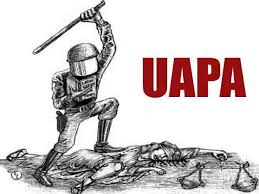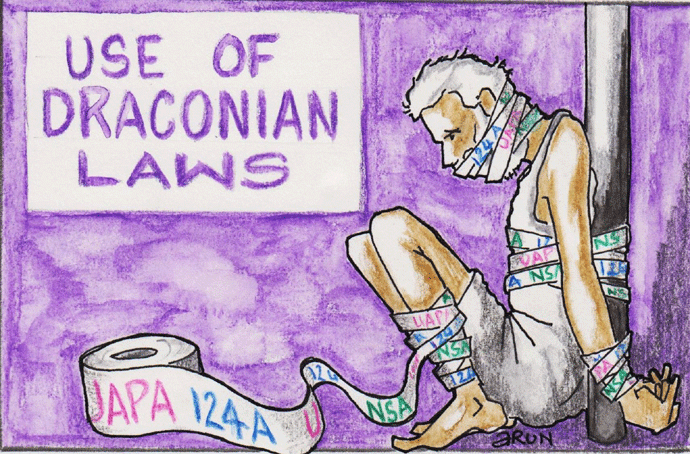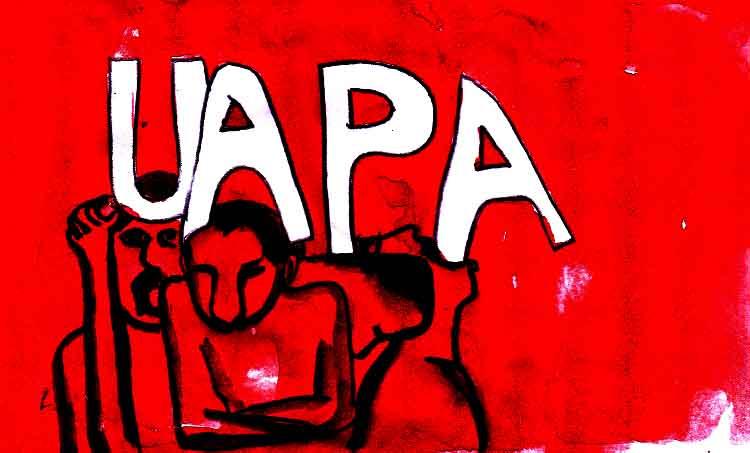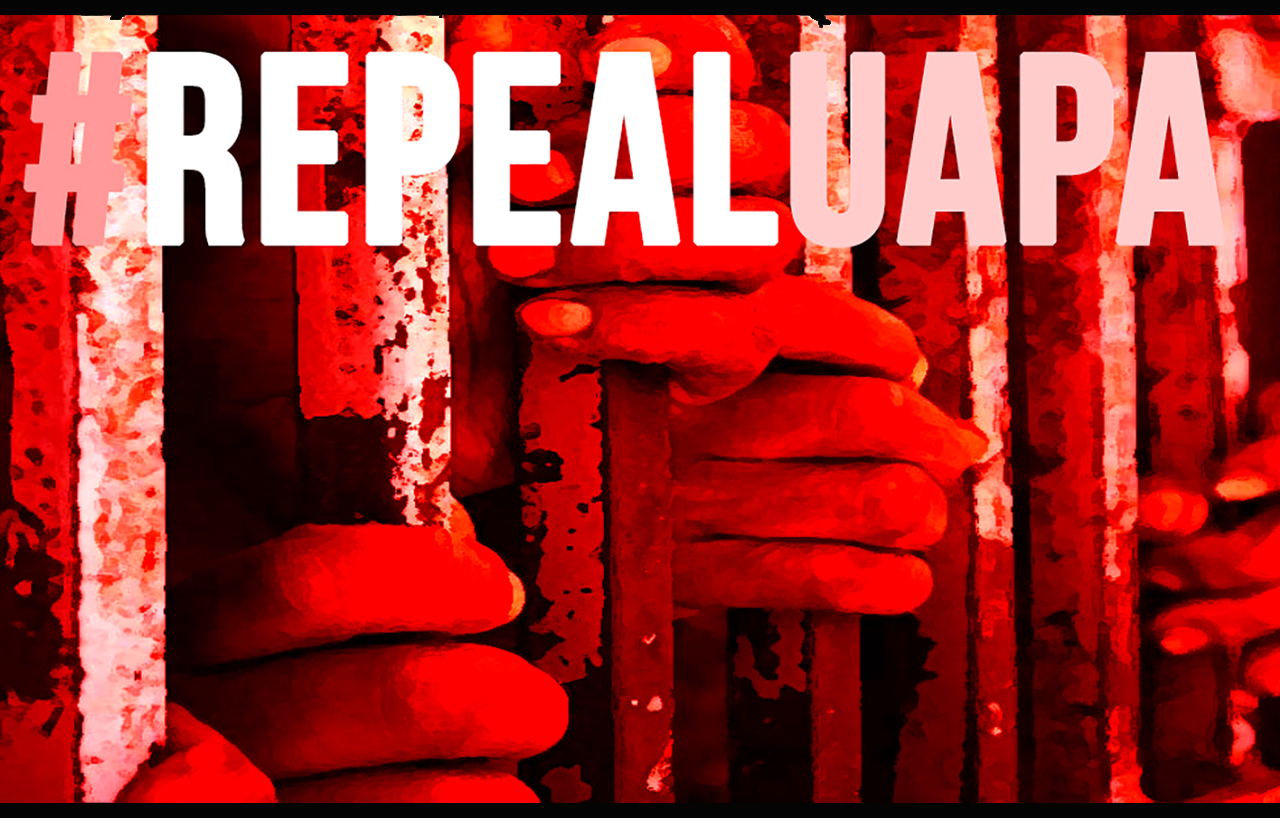Groundxero is collectively publishing this article specifically on UAPA in order to clarify what this law actually amounts to and how its draconian provisions are used by the State to incarcerate political and human rights activists, lawyers, workers, students, journalists, artists – just about anyone, who speaks for the rights of the oppressed in this country.
We are going through one of the most repressive times in post-Independent India where the fundamental rights of expression and the right to form any organization or association that can question government policies or fight for rights of the people have been criminalized. The government, armed with acts like Unlawful Activities Prevention Act (UAPA), is coming down heavily on all those standing up for the rights of economically and socially marginalized sections of people.
Not being satisfied with this, the government and its paid media is going ahead and labeling such political and social work as going against the territorial integrity of India or causing disaffection against India, and therefore unlawful.
If we want a society where debate, dissent and collective resistance to centralization of wealth and power form the core of democracy exist, we should try and see where UAPA and similar acts fit exactly within such a vision of a free India. These acts do not stop at undermining existing hard-won rights by toiling masses but criminalize any expression or struggle for the rights of people.
As per UAPA, there need not be any trial that will prove one guilty of charges. Under the UAPA, it can take years to be acquitted. In 2015, the government’s own statistics show that 72.7% charged under this law were acquitted. It is unsettling to imagine the number of people who spend time in jail for a crime they did not commit!
What is the crime of those arrested under the UAPA? Read on for some more details on UAPA and what they mean for our democracy.
Q: Why should we be concerned about the Unlawful Activities Prevention Act?
Any arrest according to existing criminal law requires a warrant. Under UAPA, the police is free to arrest without any warrant. After that, the police is allowed to take up to 180 days to produce a charge sheet, while criminal laws otherwise require that the charge sheet be produced by 60 days if the crime the person is accused of is a crime that may warrant a punishment of less than 10 years, and 90 days if the punishment is for more than 10 years.
In India, the 180 days allowance is now a reality. This is precisely what the security agencies can do to any of us using the powers afforded to it under UAPA, should we stand for our rights. Should we be not concerned?
In 2011, a member of the Kabir Kala Manch (KKM), a cultural group formed in Pune after the Gujarat carnage of 2002, was arrested (along with 5 other young activists) under the UAPA by the government of Maharashtra, and later in 2013, 4 other members of KKM were arrested again under the same Act. A cultural group performing songs and plays opposing caste and communal atrocities became a threat to national security of the ‘mighty’ Indian state. Since the state does not have to justify its reasons while invoking UAPA, the KKM members were charged and arrested for being associated with the banned Maoist party without any proof. Their crime was that they had led a cultural protest against communal pogroms carried by the Rashtriya Swamyamsevak Sangh (RSS) and spread awareness against caste atrocities through their performances.
The dangerously vague provisions of the Act have been regularly interpreted to describe almost anything as ‘causing disaffection against India’ or ‘acting against the interests of India’. Anyone who says ‘no’ to illegal corporate land grab, supports the right of workers to form a trade union or stands up for self-determination of the people of Kashmir, their “intention” will be up for scrutiny. Any expression of dissent against any actions or policies of an elected government has become criminalized. One of the most effective weapons the state has been using for such criminalization is the UAPA.
Let us try and understand what the UAPA is, where it comes from and why it has become so handy to those in power.
Q. What is UAPA?
The Unlawful Activities Prevention Act (UAPA) is an act by which central or state government has unlimited powers to ban an organization, arrest an individual and term any activity terrorism if it does not fit their agenda. The UAPA came into existence in 1967. In its original form it gave central government unlimited powers to ban any organization, which it believed was advocating secession.
As if this was not bad enough, the law was amended in 2004, 2008 and 2012 to such an extent that for the vast majority of the people, the act acquired immense potential to turn India into a police state. For example, according to these amendments whose wordings remain completely vague, any activity which can even include writing, singing and dancing and that are interpreted by the government as ‘intentions’ to disrupt territorial integrity of India or even more ironically, causing disaffection against India, can be considered unlawful. So for example, if one writes an article in a public forum that demands that independence for Kashmiris should be discussed, she may be arrested under UAPA.
And what does one mean by ‘causing disaffection against India’? KKM members were performing songs and plays about government policies like forcible and illegal acquisition of land for the benefit of big industrialists as well as caste and communal atrocities raising valid points of concerns but were still arrested under UAPA.
We do not have to actually commit any crime to be called a criminal under the UAPA.

Because the Maoist party is banned, if someone’s beliefs coincide with any of the beliefs of this party, she can be thrown in jail under UAPA without proof. It was under UAPA that Prof. Saibaba of the Delhi University, who is 90% disabled, is currently serving imprisonment after being convicted by a Maharashtra court. To get arrested one does not even have to be a member of the banned organization. In a healthy democratic society, banning organizations without due process of law itself would be unacceptable. Arresting an ex-member of a banned organization would be considered even more ridiculous and unlawful. Arresting a person who may not even be a member of a banned organization but holds similar or same set of beliefs should sound like a law only fit to be implemented in a totalitarian state. That is exactly what UAPA is and does.
The UAPA has neither any provisions for mandatory periodic review as earlier national security laws like POTA and TADA did, nor is it time-bound (that is, it will not be automatically repealed even if it is not implemented over a certain period of time). Thus, the UAPA has become a permanent legislation.
Q. How does UAPA go beyond existing criminal laws?
- The UAPA allows the police to search, seize and arrest without a warrant.
- It allows detention of the “accused” without filing of a charge-sheet for up to 180 days and police custody can be up to 30 days.
- The underlying principle under all criminal law is that the accused is held to be innocent unless proven otherwise in a trial. The UAPA has turned this underlying principle on its head. The act primarily works on the presumption of guilt merely based on the evidence allegedly seized (which could include magazines of an organization from the time when the organization was not even banned!). It invalidates what till today defines evidence to be; the standard of inquiry has thus fallen.
- While bail is a right, the UAPA makes it much more difficult for an accused to obtain bail. Unlike criminal laws, anticipatory bail does not apply here. Thus, no legal mechanisms exist which can safeguard citizens against this rampant misuse of power by state and security apparatus.
- UAPA is not only a license to arbitrarily arrest but also to arbitrarily hold a person in confinement for long periods. ‘Terrorist Act’ has not been well-defined; any form of protest may become a Terrorist Act wherein the punishment may be up to Life Imprisonment or Death. Most of the sections in the Act prescribe minimum punishment of 5 years, irrespective of the nature of offence.
- All this for a crime that remains undefined. As we saw, one does not have to commit any crime to be arrested under UAPA, rather, one can be arrested for one’s beliefs.
Q. Do we have the freedom to think independently and hold different ideologies ?
In the wake of liberalization of the economy, the central and state governments have become increasingly intolerant to any opposition of their economic policies. In the last four years we have seen the BJP/RSS government combining the neoliberal paradigm with its Hindutva agenda and any opposition to its attempt to turn India into a Hindu Rashtra being termed anti-national. In effect, if someone’s ideology is against the ideology of the RSS or that of the World Bank, she can be called a Maoist and arrested under UAPA.
However, in May 2015, the Kerala High Court delivered a landmark judgment that just being a “Maoist” is no crime, and that the police cannot arrest a person just on that account. This came in the wake of several arrests without warrants by the police and paramilitary forces for abiding to left-ideological beliefs. The court also stated that a balance has to be maintained between the needs of the law enforcement agencies and the protection of the citizen from oppression and injustice of the state.
Earlier in February 2011, the Supreme Court had ruled that mere membership of a banned organization does not make a person criminal unless he or she resorted to or incited people to violence. The ruling assumed significance in the wake of life imprisonment given to the civil liberties activist Binayak Sen by a sessions court in Chhattisgarh. The Supreme Court passed the order while upholding the appeal of Arup Bhuyan, an alleged activist of the banned ULFA, challenging his conviction.
Today, resistance to any coercive or exploitative move or policy made by the present regime to push its economic and communal policies by any organization or individual is deemed to be terrorism. When there is no answer to the organized demands of those struggling for their rights or to any writing or view expressed as a critique of the present regime, it has become expedient to term it as Maoist, Naxalite, Islamic terrorism or separatist terrorism, as seen in the case of Manipur (which had the highest number of UAPA cases in 2015, followed by Assam).
Q. What are the fundamental rights under the constitution that the UAPA violates?
The UAPA violates two most important fundamental rights guaranteed under the Constitution of India: Articles 19 and 21:
- It violates the Right to Freedom of Speech and Expression, to Form Associations and Unions.
- It also violates the Right to Life and Liberty.
Q: Who can be arrested?
Anyone. But when the state is governed by an anti-people ideology and blatant bias for capitalists, some are more likely to be arrested than others. Those who speak up when injustice is being meted out to them or to others around them or are not in the good books of the authorities for making demands on behalf of a community or exploited sections are vulnerable to such the repressive law. If you ask what the State is doing in Kashmir or why innocent people are shot dead in encounters or while taking part in peaceful demonstrations, your act of questioning itself is criminalized.
Looking at the hundreds of people arrested under the Act, we see that workers, political activists, lawyers, journalists, students and artists have all been arrested under this Act. A common factor among all the people arrested under UAPA is their opposition to injustice perpetrated on the most marginalized and most exploited sections of society: minorities, workers, adivasis and dalits.
Most of those who have been arrested belong to the marginalized communities – adivasis, dalits, minorities, denotified communities. In 2013, 53% of population in prisons across the country comprised of dalits, muslims and adivasis, who comprise only 39% of the country’s population. Everyone is certainly not equal before the law!
Industrialists, ministers, VHP and Bajrang Dal members who commit atrocities against religious and caste minorities, police and security personnel who can shoot at unarmed civilians, have remained and will always remain protected from acts like the UAPA. Those lynching Muslims in cases of cow vigilantism have never been arrested under UAPA.
Q: Who have been arrested?
The working class:
Anti-working class bias of this government means that workers who assert their rights are likely to face intense state repression. When workers try to unionize, they don’t do anything illegal and so UAPA is often the only resort to stop their activities. Let us take a few examples: registered and old unions like Mazdoor Sangathan Samiti in Jharkhand, Bombay Electricity Contract workers Union and Mine workers in Sukinda district in Odisha have been victims of UAPA-induced injustices.

Illustration by Arun Ferreira
Mazdoor Sangathan Samiti (MSS) is a registered trade union in Jharkhand which has worked with the informal adivasi workers since 1989. It has over 22,000 registered members. In November 2017 MSS organized a cultural program to celebrate 100 years of Russian Revolution. The BJP state government banned MSS since celebrating Russian Revolution is a criminal offence. This ban did not follow any legal procedure, MSS was not even allowed to defend charges against it. In February 2018, leaders of the MSS, Bachcha Singh and Deepak Kumar were arrested under UAPA with the all too familiar charge of them being associated with the Maoist Party.
The Bombay Electricity contract workers union is one of the most well-organized unions in Bombay. Ever since its establishment in 2005, it has fought for rights of the contract workers to work with dignity and have won many struggles. In January 2018, 5 of its most prominent leaders were arrested for their supposed involvement in Bhima Koregaon violence under UAPA; they still remain in jail. With most of the leadership in prison, the union has suffered a severe setback and Adani, who now owns the company, has a free reign in exploiting workers further.
On June 12, 2017, three mine workers were arrested in Sukinda district in Odisha to intimidate and prevent the mine workers from forming a trade union and challenging human rights violations resulting from mass adivasi displacement in the region. They were arrested under the UAPA on false and fabricated charges of conspiring to wage a war against the Indian state and inciting violence.
In the Bhangar movement in West Bengal, where people have organized a movement to protect their land, ecology and environment, 19 activists were arrested under the UAPA from January 2017 – 13 of these were local villager and 6 were activists from urban areas. The TMC government made all attempts to terrorize the people with midnight raids, burning down of their shops, bomb attacks as well as arresting and torturing the family members of those active in the movement.
A lawyer trying to get justice in such cases or a reporter trying to write about such cases, are not safe. Yes, UAPA also interferes with journalists and lawyers who uphold honesty and integrity of their profession and refuse to become lackeys of the rich and the powerful.
Journalists:
Santosh Yadav and Somaru Nag, two fearless journalists working in Bastar were jailed under UAPA in 2015 and then released after spending a year in jail as the charge of them being Maoist supporters turned out to be completely fabricated by the police. In fact in 2015 and 2016, Chhattisgarh police threw four journalists behind bars with the help of the UAPA.
Lawyers:
Advocate Murugan who works with political prisoners in Tamil Nadu was himself arrested and the charge was that he is a Maoist.
Surendra Gadling, a dalit activist and human rights lawyer who has worked tirelessly for release of political prisoners was arrested in June 6th for his supposed involvement in Elgar Parishad, which was an absolutely legally organized public meeting.
Vachinathan, who as a lawyer supported people’s movement in Tuticorin against the Sterlite plant, was arrested. Charges against him was that he incited the protests. He is still in jail.
More recently, on the 28th of August 2018, Advocate Sudha Bharadwaj, also a democratic rights activist, trade unionist and lecturer, was arrested from Faridabad under the UAPA. So was Arun Ferreira from Thane in Maharashtra.
Activists:
Scores of activists are arrested and kept in jail for extended periods under this Act. These activists come from different strata of society and their only ‘crime’ is, as always, fighting for the oppressed and questioning government policies.
Democratic rights activist Shoma Sen, adivasi rights activist Mahesh Raut, along with Sudhir Dhawale, a dalit activist and editor of an independent magazine from Maharashtra, Rona Wilson who has fought for rights of political prisoners and advocate Surendra Gadling, were arrested under UAPA. They have been accused of fomenting hatred among communities by being involved with a Dalit Conclave called Elgar Parishad which was held in December 2017 in Pune, Maharashtra. Clearly being part of a dalit conference has become a crime. This notorious FIR is being used to conduct raids and arrests till today.
Using the same FIR, most recently democratic rights activists Gautam Navlakha from Delhi and Vernon Gonsalvez from Mumbai and senior activist and poet Varavara Rao from Telangana have been arrested under the UAPA. These arrests were in connection with fictitious letters that the police furnished to the media without even submitting them in the court. Although the court reprimanded the Maharashtra police for initiating yet another such media trial, since the trials are under UAPA, they will continue.
The list can go on and on. In 2015 over 100 arrests were made in Kerala alone under UAPA. 92 of those arrested were Muslims and the others were accused of belonging to the Maoist party. The arrests were so arbitrary that the police itself formed a special committee to investigate these arrests and found a number of them to be fabricated.
Students:
While Hindutva-based student organizations like ABVP are getting a free reign in campuses, Muslim students’ organizations like SIMI have been vanquished under UAPA.
Adivasis and minorities:
In Jharkhand scores of dalits and adivasis have been arrested under the UAPA and kept in prisons for long periods as undertrials. In Madhya Pradesh, UAPA is a demon which has terrorized the Muslim community. After the act was used to ban the Student Islamic Movement of India (SIMI) in 2001, Madhya Pradesh police uses the ban on SIMI to arrest scores of ordinary Muslims who are accused of being members of SIMI. As the police do not need to give any explanation while using the UAPA, a ghastly scenario has emerged in Madhya Pradesh where prisons are filled with Muslim under-trials, other than those who have been killed in ‘encounters’!
Q: What has been the role of the media?
Trial under the UAPA in courts is both slow and uphill. Sections of the corporate media carry on a media trial where the presumption of guilt that the UAPA is based on, is upheld in an irresponsible and biased manner. Thus, the opportunities of a free and fair trial are further jeopardized. The accused is pronounced guilty even before the trial is over.
In essence, such biased media reporting upholds the economic policies and the heavy repression of dissenting voices. The search for investigative and objective analysis has become a far cry. Facts are overridden by propaganda of a repressive state and its media houses.
While the media sensationalizes arrests, it maintains a stony silence on the hundreds of meetings and marches and demonstrations held in Maharashtra, Delhi, Punjab, Madhya Pradesh, Chhattisgarh, Jharkhand, Odisha, West Bengal, Tamil Nadu, etc. by the public and democratic forces that oppose and question the misuse of the Act.
Q: What can be done?
Over about the last three decades the situation in the poor sections of society has turned extremely difficult, though it is surprising that it could get nay worse. Since the 1990s, the situation especially changed for the worse. While earlier there was some semblance of the governments being bothered about the condition and mood of people, after the ‘90s, the entire scenario changed in most countries of the world including India. The fact that the rich were becoming richer and the poor poorer did not deter governments from following the same policies that kept enhancing the process. The laboring poor, adivasis, dalits were rapidly dispossessed of whatever little they owned or had control over – land, forests, decent jobs, access to health care and education, nutrition, and all else. The share of the total national income that went to these sections of people became smaller and smaller. For example, according to an Oxfam study in the year 2017, 73% of the wealth created in India went to the top 1%, while the poorest 50% of the people got only 1%. Globally, 82% of the wealth in the year 2017 was cornered by the top 1%, while for the poorest 50%, there was no increase in wealth at all. For very large sections of people life became more and more difficult, with very long working hours, precarious employments, low wages, bad and unsafe working conditions, high morbidity and mortality, continued violence against the most marginalized and so on, while wealth and ‘development’ continued unabated and was more and more concentrated in a very small section of the extremely wealthy.
In order to merely assert one’s humanity and right to dignity and life, sections like workers, peasants, dalits, adivasis, women, forest dwellers, fisher-folk and many more sections came out to protest, struggle and organize. That became the only way in which they could live and not perish.
This struggle for survival and dignity, this striving for a better future for themselves and their loved ones has been termed by those very wealthy people and their spokespeople as subversive, anti-nationalistic, terrorism, left-wing extremism. This is a weapon that seeks to de-legitimize the very real and legitimate struggles of the people, to malign and stigmatize people who do not agree with this obscene inequality.
The more we keep quiet, the closer it will come and swallow us, more and more of us. That is why we need to oppose UAPA in a more organized, collective and sustained manner.
Sustained because, earlier there were two very draconian Acts – POTA and TADA. Immense efforts and energies were expended by committed human rights organizations and other organizations to oppose those legislations. We succeeded in getting them repealed, only to have the most draconian and anti-democratic clauses being added to this UAPA. After so much effort and organizing, we were left with the same provisions that took away almost all our political rights.
Friends and comrades, this is merely a beginning to understand a very dangerous and repressive law. It is crucial at this dark hour to collectively fight for the repeal so that we are one step towards greater freedom and democracy!
REPEAL UAPA! Uphold the Right to Dissent!

Images sources: Malayalam Indian Express, The Leaflet, Kractivist, Indian Political Prisoners Blog
Do feel free to share, publicize, translate or print the article so that we can together build a strong resistance against the oppressive regimes.

